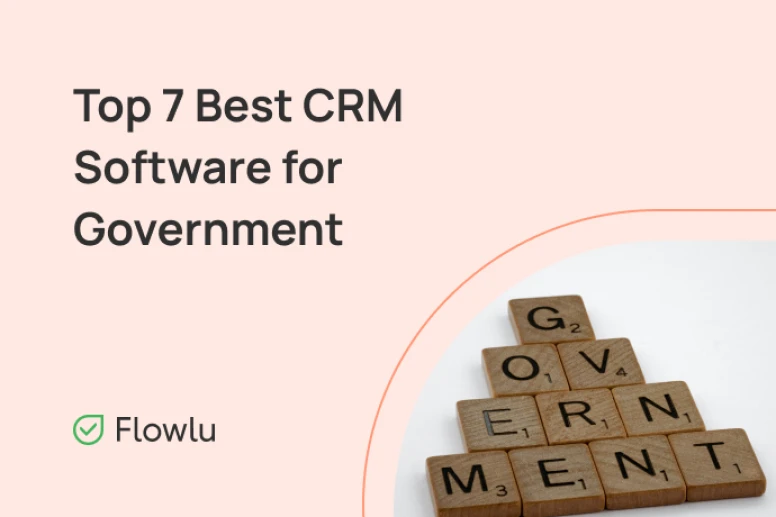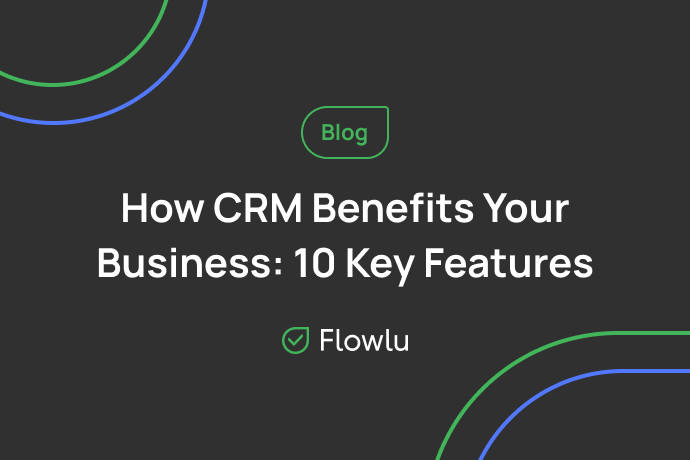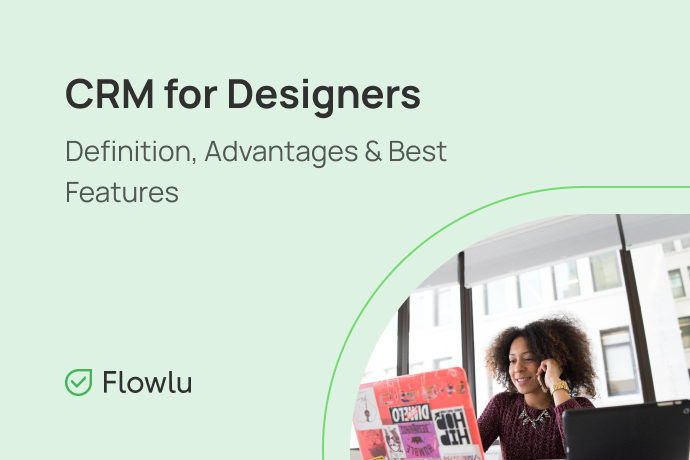What CRM Does the Government Use?
CRM is an automated system to help business owners track all communications, build and maintain relationships with both leads and customers.
If you think about it, a CRM system easily replaces the numerous spreadsheets, apps, and databases that many businesses need to use together to keep track of customers’ data. So, with just a CRM system like Flowlu, you get organization, efficiency, better time management, and impress customers.
Ultimately, a CRM system aggregates all your data in just one place. From all your communications including calls, emails, meetings, and form fill, to purchases, quotes, documents, and all the tasks associated with each customer and lead. The main benefit is that all your staff can access those details at the right time to make sure they can close the sale or deliver outstanding service.
What Does A CRM System Do?
As its name implies, a CRM system’s main goal is contact management. After all, its main purpose is to store and manage all data for all kinds of contacts, from leads to business partners. But now you’re thinking that you can use a spreadsheet instead. Well, you could but you will end up with multiple spreadsheets where you can never find what you need in time. The information will be scattered over your spreadsheets and you never know where exactly you can catch what you are looking for.
Although a document or spreadsheet may be a good solution when you have a few contacts or you’re just collecting simple contacts and users’ data. However, a CRM system like Flowlu is a dynamic and more complex data center. After all, it can keep track of what emails a contact has opened, their last purchase date, details of previous communications or even a call record. CRM also integrates well with other tools like digital business cards which allows automated lead sync and follow-up. The best part of using a CRM system is that it updates automatically as your customers and leads take action. In case you were still using spreadsheets, you have to add this data manually.
The best CRM systems like Flowlu, allow you to see how hot or cold a lead is, at a glance. You can set your own rules to make sure that you clearly identify these leads.
As you can see, all these examples are mostly linked to sales and marketing activities, but there are also some cases in which CRM is a good option, especially when you don’t need to sell anything and simply want to capture, store and organize peoples’ data.
CRM Systems For Government
When you think about the government, it is not about marketing or sales. For government structures, in the first place is providing services, taking applications, track and resolve cases, and addressing issues as well. But as we have been seeing, these tasks have also been changing. Most governments are trying to remove paper from the process and make everything digital. This is where a CRM system for governments enters. Not only can a CRM system help governments become paperless but it can also help automate processes to make the workflow smooth and seamless.
Speaking of a CRM for the government, it’s important to note, that in governmental systems, most processes are strict and don’t require regular and urgent changes, so you can easily build automated workflow for communication with applicants.
What CRM Does The Government Use?
One of the best things about CRM systems is that they can be adapted and customized to specific tasks. As we already mentioned, the main goal of the government isn’t to make a sale. So, they need to look for a CRM system that allows them to help the entire population get the best from the services provided. You can see this as having optimal customer support if you are thinking about businesses.
Note that governmental structures require specific CRM, so not any of them can be a match. In some countries, CRM systems should comply with specific requirements to be used for government management. In most cases, there are legal and security requirements.
Unlike what you may think, many governments are already using CRM systems. Here are some of the most popular ones:
Blue Utopia
Launched back in 2004 by three close friends, Blue Utopia was based on the idea that software can offer a significant advantage to political campaigns and promotions. Its main goal has always remained the same: To create and deliver a well-designed system to Democratic political campaigns and nonprofits — one that could make a real difference on the election day.
ABM CRM
ABM CRM is a bit different from the previous one. Although it features tools that can improve promotion campaigns and increase quality of the final output of your services, this CRM system also allows you to build a work environment where governments can access regularly updating customer information.
Arcus Global
Cloud computing still isn’t cheap. This is one of the reasons why many governments haven’t still started using a CRM system. However, Arcus Global is determined to make a difference. The company wants to allow governmental structures to use this technology most cost-effectively and innovatively. They believe this is crucial to ensure that governments can continue not only to deliver but also to improve their services and communication with the public. One of the main benefits of using Arcus Global CRM is that they keep improving its product to meet new challenges.
Maximizer CRM
Known as the number one CRM for governments, the Maximizer CRM is trusted all around the world. After all, it doesn’t only allow governments to streamline current processes but also be ready for growth.
One of the main advantages of using the Maximizer CRM is that the costs are pretty low since they have a cloud option. With this CRM system, governments can ensure high levels of service and increase customer retention and satisfaction while all the data collected is maintained private and secure.
Infoflo
The good news about Infoflo CRM is that it can be used not only for the private sector as it can also be used by the public sector. Wide range of user-friendly features and customization allow it to be a solution for many. Governments that want to use the Infoflo CRM system can choose to use it on their own local network or in the cloud. One of the things that makes disc CRM stand out is that it includes many free services like advanced reporting, telephony recording, and email integration.
FundView
FundView is designed specifically for local governments. Offering powerful and user-friendly, the company also offers excellent support.
Overall speaking, the FundView CRM system allows governments to streamline their processes, simplify workload, and meet the needs of their citizens.
Verint Express (ex KANA Express)
Verint Express (ex KANA Express) was designed for State Government Agencies. Its main goal is to help these agencies build stronger relationships with constituents, partners, and vendors. These relationships can be built through their preferred communication channels: Email, cologne, mobile, chat, social, or the web.
It is designed to integrate with back offices, so this way, State Government Agencies can have a complete overview of the applicants and automate adherence to policies.
Summary
Governments, just like private companies, need to keep track of citizens. Since governments offer a wide range of services to the general population, it’s important to maintain all information in just one secure place. But more than storing this information, it’s vital that citizens can get answers to their problems and issues on time. While in the old days the population had to go to public departments in person, governments are trying to make life easier for their citizens.
By coming up with solutions to become paperless and more digital, the government will be able to save a lot of money as well as time. But more than this, by keeping track of their citizens and the way they communicate, they can develop ways and processes to improve the communication and overall satisfaction of citizens.
Governmental systems commonly choose cloud-based management software, or SaaS CRM systems.
Government CRM is a tool to manage regular administrative tasks, applications, and communication with people.
There are three types of CRM software: operational, analytical, and collaborative. Which one to choose depends only on your needs.
Most governments use the following CRMs: Blue Utopia, ABM CRM, Arcus Global, Maximizer CRM, Infoflo, FundView, Verint Express, etc.











